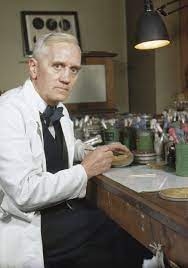
Alexander Fleming was one of those scientists who accidentally invented penicillin, the world’s first antibiotic. In 1928, he inadvertently left a petri dish (a plate used to culture cells) on his lab bench and went on a vacation. On his return, he found that some liquid around the mold had killed the bacteria in the petri dish. This eventually led to the invention of the world’s first antibiotic. Fleming called it “mold juice” before it was named penicillin.
Although Fleming published the discovery of penicillin in the British Journal of Experimental Pathology in 1929, the scientific community greeted his work with little initial enthusiasm. Additionally, Fleming found it difficult to isolate this precious ‘mould juice’ in large quantities. It was not until 1940, just as he was contemplating retirement, that two scientists, Howard Florey and Ernst Chain, became interested in penicillin. In time, they were able to mass-produce it for use during World War II.
Fleming received many awards for his achievements. In 1928, he became Professor of Bacteriology at St Mary’s. He was elected a Fellow of the Royal Society in 1943 and elevated to the level of Emeritus Professor of Bacteriology at the University of London in 1948. A recipient of some thirty honorary degrees, in 1945, he won the most prestigious award, the Nobel Prize in Physiology/Medicine. He was made a Knight Bachelor by King George VI in 1944 and a Knight Grand Cross of the Order of Alfonso X the Wise in 1948. Time Magazine named Fleming one of the 100 most important people of the 20th century.
Picture Credit : Google




